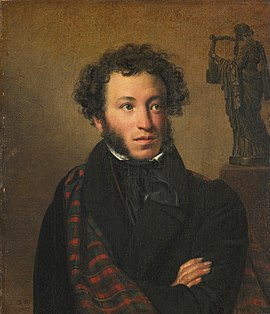Alexander Pushkin ( 1799-1837 )

Alexander Sergeyevich Pushkin was a prominent Russian poet; he is regarded as one of the founders of Russian literature.
He was born in Moscow on June 6, 1799, to a noble family. As a boy he was entrusted to French tutors and therefore had limited contact with the Russian language. In 1811 he left Moscow for Saint Petersburg to study at the Imperial Lyceum of Tsarskoye Selo, recently founded by Tsar Alexander I. In 1814, aged just 15, Pushkin published his first verses. After his graduation from the Imperial Lyceum, in 1817 Pushkin was appointed to the Russian Ministry of Foreign Affairs under Ioannis Kapodistrias. Nevertheless, poetry continued to be his main pursuit. At that time, Pushkin also wrote satirical verses about the Russian society and the authoritarianism of the tsarist regime, as a result of which he was considered anti-monarchist and fell into disfavour with Alexander I. Thanks to the intervention of leading Russian literary figures and Kapodistrias, Pushkin avoided exile to Siberia, but not displacement to southern Russia, where he remained for about six years in Yekaterinoslav (today Dnipro, Ukraine), Chișinău (today the capital of Moldova), and Odessa, Crimea.
During his sojourn in southern Russia, Pushkin became associated with prominent figures of the Greek community and was initiated into the secret Filiki Etaireia. When he was informed of the outbreak of the Greek Revolution in the Danube Hegemony, he readily supported Alexandros Ypsilantis’s actions despite the lack of encouragement by the Russian government. It was then that, inspired by the idea of engaging in the struggle of the Greeks, Pushkin wrote the poem “War”:
To war! Lifted at last, the banners of martial honour swish!
I will see blood, I will see the celebration of revenge;
the deadly lead will come whining around me.
Although the Russian poet was disillusioned by the outcome of the Battle of Dragatsani and Ypsilantis’s fleeing to Austro-Hungary, he never ceased to write in support of the Greek cause, leaving behind a rich legacy of philhellenic sentiment in a series of letters, diary notes, and poems dedicated to or inspired by the War of 1821. Certainly, the civil strife and disputes that arose in revolutionary Greece, later on, provoked the scepticism of the Russian intellectual (as, after all, of many other Philhellenes) about the evolution of the struggle for national independence. Nevertheless, his concern for the Greek cause remained constant and selfless until the auspicious outcome of the uprising. Arise, o Greece, Arise! wrote Pushkin in 1829, recalling to his memory the unprecedented feelings he had felt a few years before upon hearing the news of the Greek Revolution. This was the great poet’s last ode to the Greek cause. Pushkin’s life was now taking a strange direction. Having returned to Saint Petersburg by 1826, he witnessed the censorship of his works – by the new Tsar Nicholas I personally – and his companions’ being accused of apostasy.
In 1831 in Moscow Pushkin got married to Natalia Nikolayevna and three years later was appointed at court to the rank of Kammerjunker, or gentleman of the bedchamber. He died in Saint Petersburg on February 10, 1837, after a duel with his wife’s alleged lover, Georges d’Anthès, the adopted son of the Dutch ambassador to the Russian capital. Pushkin was only 38 years old.





